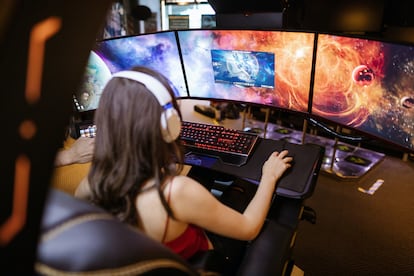In the video game industry, women confront sexism, harassment
Despite representing 53% of video game players in Spain, women only account for 24% of jobs in the sector

Jen Herranz’s career was ended by a tweet. A streamer, online presenter and editor specializing in the world of video games, she spent a decade working in a niche where women are barely represented.
With a total of 160,000 followers between Instagram, Twitch and Twitter, she explains that she decided to leave everything a few months ago, because of a “slightly unfortunate comment about some exes” that she made online. “A tweet that, if a male colleague had posted it, nothing would have happened. But women are always treated differently, especially in this world, where harassment is constant,” says Herranz.
The comment had to do with the speed with which players of the online game League of Legends (LoL) – which has more than 180 million participants – know how to touch the keys.
Herranz shared a tweet from another user, who expressed the desire to have a boyfriend who plays LoL (because of his supposedly better ability to masturbate a woman). She added to the original tweet that, having been with two gamers in the past, she could assure this user that their capacity to be good at “fingering” was limited.
The avalanche of attacks, insults and threats that she received in the following days (almost all from men) led her to the decision to abandon her social media accounts and quit her job as a streamer. “It was the best decision for my mental health – I had been having anxiety attacks on a daily basis. [But] this decision also works against me, because I’ve lost my main source of income. It’s difficult to pay the mortgage and my bills,” she notes. “I was in [the video game sector] for ten years and now I have to start over from scratch.”
In fact, Herranz didn’t quit her job solely because of an unfortunate tweet about her ex-boyfriends. She left it because, since she began to write and speak on video game networks, users would refer to her as their “girlfriend,” or they would call her a “whore” or “bitch” – words that, for years, she filtered out of the comments beneath her content. Her case is certainly no exception in the world of video games, where harassment is very present, especially towards female players. Five in six adults (83%) between the ages of 18 and 45 experience bullying in online multiplayer games, according to a 2022 report by the Anti-Defamation League and Fair Play Alliance. Two years early, the rate was at 74%, showing significant growth. The largest increases in bullying occurred among women and members of the LGBTQ community.
“Online harassment is a very problematic issue, because, for many users, this seems tolerable or even acceptable. There are those who think that it’s necessary to behave like this to be part of the group,” explains psychologist Celia Hodent. The expert – who works as user experience director for various video game firms – acknowledges that, in some cases, online games are beginning to have codes of conduct to penalize cases of harassment… although it would be even more effective to introduce changes to the gaming system. For instance, when logging on, the microphone can be turned off and the player can have the choice to activate it. Thus, nobody is forced to reveal their sex if they don’t want to.
On the other hand, when it comes to prevention, Hodent emphasizes the work done by platforms such as Raising Good Gamers and Fair Play Alliance to educate young players. “It’s all about stopping certain behaviors [that are often excused] with the argument that ‘boys will be boys.’ It’s essential that they understand that, when they’re playing online, they’re still in a social space, where the same real-life rules of conduct and respect apply.”
In Spain, men stopped having a monopoly in this sector years ago. When it comes to getting behind a console, women represent 53% of video game users in Spain, according to the 2022 White Paper on Spanish Video Game Development. However, this percentage plummets when it comes to those who work in the field: women represent only 24% of the professionals. Eurídice Canañes – who holds a PhD in Philosophy and is the co-director of the video game company Arsgames – explains that one of the causes of this disparity between men and women is in the socialization that takes place in childhood. “When asked at school who plays video games, boys quickly raise their hands, while girls have a harder time admitting it. They usually say that they play… but always after finishing their homework. And this is a problem when it comes to working in this field, because the consumption of video games is closely related to STEM careers,” the expert comments, referring to the fact that science, technology, engineering and mathematics tend to be predominantly male. She deals with designing games and researching the dynamics in the industry.
According to Hodent, another reason why the industry continues to be male-dominated is due to the so-called “ingroup bias” – that is, the tendency to hang out with people who look like us. “Right now, the video game industry is controlled by men who were passionate about fighting games in the 1990s, who had an almost exclusively male audience. These same men – when it came to creating a video game company – would hire their own friends. Before they knew it, they would end up with a group of only men,” she notes.
Women not only represent a minority in companies that develop video games: they’re also missing in the world of specialized communications that are associated with this activity. Women barely make up 18.6% of the staff of the major video game magazines in the sector. And, in most cases, if they’re involved, they tend to be external collaborators, according to a study by the University of Malaga (Spain) that analyzes the presence and role of women in video game journalism. “Job insecurity – along with machismo – is another of the reasons why there are so few women in the industry,” Cabañes confirms.
A few days after Jen Herranz decided to leave social media, another well-known woman in the world of video games also said goodbye to a long career. Marta Trivi started out as a cultural journalist writing for film and television, until, eight years ago, she began dealing exclusively with video games. In 2018, she was one of the few women who wrote on AnaitGames – a specialized portal for which she worked until this past May. “I had to constantly prove everything [I wrote]. Many times, people criticized me for being the only woman in the group. When I screwed up in an article, the comments were always loaded with machismo,” the journalist explains. “It’s not that I was wrong simply because I’m a person who makes mistakes, as was the case with my colleagues. I was wrong because I’m a woman who gets involved in these issues without understanding them.”
However, the most “aggressive and misogynistic” criticism was just one of the motivating factors that influenced Trivi’s choice to leave her line of work. “It’s the precariousness that kills us,” she sighs. “There are few women on staff and, even when it comes to collaborations, we’re paid less than men. I [was] tired of spending hours on weekends playing video games to write a review. There were hours that nobody paid me… having to then put up with unbearable levels of machismo was too much.”
Sign up for our weekly newsletter to get more English-language news coverage from EL PAÍS USA Edition
Tu suscripción se está usando en otro dispositivo
¿Quieres añadir otro usuario a tu suscripción?
Si continúas leyendo en este dispositivo, no se podrá leer en el otro.
FlechaTu suscripción se está usando en otro dispositivo y solo puedes acceder a EL PAÍS desde un dispositivo a la vez.
Si quieres compartir tu cuenta, cambia tu suscripción a la modalidad Premium, así podrás añadir otro usuario. Cada uno accederá con su propia cuenta de email, lo que os permitirá personalizar vuestra experiencia en EL PAÍS.
¿Tienes una suscripción de empresa? Accede aquí para contratar más cuentas.
En el caso de no saber quién está usando tu cuenta, te recomendamos cambiar tu contraseña aquí.
Si decides continuar compartiendo tu cuenta, este mensaje se mostrará en tu dispositivo y en el de la otra persona que está usando tu cuenta de forma indefinida, afectando a tu experiencia de lectura. Puedes consultar aquí los términos y condiciones de la suscripción digital.









































